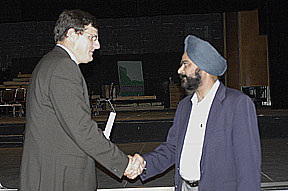
In what seemed like a resurgence of the anti-war movement of the 1960's, a crowd gave Scott Ritter, the somewhat controversial ex-UN Iraqi weapons inspector, a standing ovation after his talk at Missouri Southern State College. Ritter was invited by the Campus Activities Board. His talk was free to the public. His stipend was $5,000, paid by the CAB so that Ritter apparently would detour to Joplin on October 21 from his regularly scheduled talk circuit.
A very charismatic speaker, Ritter easily convinced the audience that President Bush's policy to invade Iraq was not in the national interest and that Bush's motives for waging war and bringing down the regime of Saddam Hussein were ill-conceived. With 12 years experience in the marine corps, Ritter gave very graphic descriptions of what war was--about killing someone and being killed, and about "being scared in combat and praying that the moment was over."
"War is not a video game," Ritter told the crowd. "It is death and destruction. We may have just reasons to defend our way of life--what we stand for, but we have obligations as Americans to make sure that the cause to die for is worthy of sacrifice." His message was that we should exhaust every venue possible before the first bit of blood is shed.
"Why are we going to war?" he asked. The decision to wage war shouldn't be a decision of the President or Congress, he said, but of the people. The President's oath to defend the Constitution is really an oath to serve the people.
Ritter admonished the audience not to accept at face value what is coming out of Washington. "Congress was lied to by the Bush administration...I am sadly betrayed by the President I voted for," he said
Ritter's comment that "there might be politics going on here," brought a laugh from the audience, but not his reminder that over 58,000 Americans died from serving in Viet Nam, a war based on lies, he said, perpetrated by President Johnson. He suggested that prudent debate, before we went to war, might have avoided casualties on both sides.
So, what is the United States' hidden agenda for removing Saddam Hussein from power? The motivation might be "oil," but nobody could admit that, he said, looking for another excuse. Making Saddam the personification of evil was the logic that won out, he said, reminding everyone that Saddam had been compared to Adolph Hitler.
A "disarmed Iraq" is not what the United States wanted, Ritter claimed after detailing how his weapons inspection team "investigated everything" and caused a significant number of weapons to be destroyed, although never being able to conclude that Iraq was completely weapon-free. "Destabilization and regime removal always trumped removal of weapons," he noted
Ritter said he resigned from his position after objecting to the change in inspections policy. He said that the impetus toward destroying Saddam meant no longer implementing the security council resolution to uncover weapons of mass destruction, but, instead, assisting the CIA in its covert actions, that of spying on Saddam Hussein.
It was all right to use the U2 planes and guys in vans trying to pick up telephone conversations to aid in finding weapons of mass destruction, but not when they were to be used for the purpose of hunting and killing Saddam, he said.
Ritter made it clear that it would be against international law to get rid of Saddam. "We have to respect the dignity and national sovereignty of Iraq," he said. Spying on Saddam does not implement the security council resolution.
Ritter admitted that in the four years since Iraq said no to inspections, we don't know what they've done, and that there are "a lot of unresolved issues." He inferred that the U.S. government in not supporting the continuation of inspections to which Iraq has now agreed prevents the possibility of finding nothing there and consequently thwarts the lifting of sanctions. Ritter favors continued inspections. We can find non-compliance. I believe the inspectors can succeed, he said.
But to President Bush's claim that he knows there are weapons of mass destruction, Ritter says, "Show me what you know." He made an analogy to a doctor telling his patient that he has a brain tumor, yet refusing to produce the MRI or x-ray that revealed it.

Scott Ritter shakes hands with Dr. J.S. Duggal, professor in the computer-aided design program at Missouri Southern.
Just like Ritter wanted the audience to hold the government accountable, so he claimed that he was making himself accountable by taking questions from the audience. In answer to the question as to why some of his current statements might seem conflicting with what he had said on other occasions, Ritter defended himself by attributing the disparities to a "maturing of (his) viewpoint."
During the question and answer period, Ritter further emphasized why an invasion of Iraq would be foolhardy. In spite of living under Saddam's repressive regime, the discontented people, he said, blame the U.S. for sanctions that led to mal-nutrition, bad water and 3000-5000 kids perishing in Iraq per day, conditions not present during Ritter's description of the country in the 1980's.
Ritter also called attention to the sense of frustration amongst the Arab world over the Israeli/U.S. coalition. How come just Iraq and not regional disarmament? he queried.
Saddam will appeal to homeland and to the church. Iraqi military will not surrender. They will fight from Baghdad--not sitting out in the desert. We will have to take the city down block by block. It will be God-awful fighting. Will we win? Ritter asked the audience, and told them to define victory. Is it worth the cost? Then what will we do--occupy Iraq? Any government will have no legitimacy that we put in Iraq, Ritter said.
The audience gave Ritter a round of applause after he mentioned North Korea. Everyone in the audience knew the potential for danger to the world after North Korea's announcement that they had missiles with nuclear warheads. Yet we seem only to be dealing with the situation there diplomatically, Ritter pointed out.
In speaking of "imperialism" or "Pax Americana," Ritter received the second round of applause. "Why are we becoming an imperial power ourselves?...we fought it," he commented, reminding everyone of "Pax Romana" and what eventually happened to the Roman Empire.
When questioned by student Monte Powell, Ritter also justified accepting a $400,000 loan from an Iraqi-American, pro-Hussein, businessman Shakir Khafaji of Detroit to assist him in producing a documentary, In Shifting Sands: The Truth About UNSCOM and the Disarming of Iraq. In order to make the documentary in Iraq, Ritter told the audience that he had gone to the FBI and had asked them to investigate the matter and to "pull the plug if there were any improprieties." Ritter claimed that he became part of a "politically motivated character assassination," and that the movie he made was not pro Iraq or pro American but "pro truth." In it he accuses the United States of manipulating the United Nations to provoke a confrontation with Saddam Hussein as a pretext for U.S. air strikes on Iraq.
What Ritter didn't mention was that he was assisted in part by Kafaji on his latest trip to Baghdad in September, according to an October 21, 2002 article in the Washington Post and that the trip, the first by an American was widely seen as a propaganda coup for Hussein. In an address at the Iraqi National Assembly, Ritter was quoted as saying: "The truth of the matter is that Iraq has not been shown to possess weapons of mass destruction." And that "Iraq today is not a threat to its neighbors."
It also should be noted that in an AP article dated July 19, 2001 Richard Butler, who was Ritter's boss, is quoted as accusing Ritter of making "a propaganda film," referring to Ritter's documentary, Shifting Sands. Butler reportedly said Ritter had always claimed to him that Iraq's banned weapons had not been destroyed. "Either he was misleading me when on the job or he is now misleading the public in his role as a film producer," Butler told AP.
I like Scott and I honestly think he's a man of great integrity, but I don't know what's going on in his mind," says Tim Trevan, ex-spokesman for the U.N. special commission to disarm Iraq (UNSCOM). "I do believe his credibility is shot . . . and I think that's very sad."
A former nuclear inspector, David Kay, said recently in Congress: "He's gone completely the other way. I cannot explain it on the basis of known facts."
Ritter's motives for bashing the administration still may seem fuzzy to many in spite of his professed anti-war stance, a position that the audience found rather compelling. He did appear to have an unexplanable agenda for promoting the lifting of sanctions in Iraq. And that he may have changed his views to create controversy, a debating ploy, may simply have made him more attractive to those who have become a part of his public speaking circuit. In any event, he seems to have strange bedfellows.
Be sure to read the commentaries, "To the victor go the spOILs" and "Folks march for peace".--editor






Comments